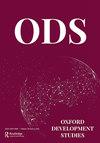The moral economy of rural Hausaland: a perspective from long-term field research
IF 1.2
Q3 DEVELOPMENT STUDIES
引用次数: 0
Abstract
ABSTRACT This essay explores a model for inequality in Nigerian rural Hausaland based on fieldwork carried out from 1977 to 1979, with follow-up visits in 1996 and from 1997 to 1998. In the model, rural differentiation in areas of high population density and intensive market networks is theorized as resulting from a trajectory of non-capitalist accumulation. Capital accumulation in such areas is limited by ‘polygynous accumulation’ and ‘cliental accumulation’. Three accumulative forms are integrated by a culturally specific Islamic morality of hidima (social responsibility for others). This morality prevents the emergence of capitalist class differences. Case studies of accumulators from the summers of 2017 and 2018 show that rural accumulators continue to build polygynous households of extraordinary size. At the same time, economic growth in the national capital, Abuja, and to a lesser extent in other northern cities, has maintained high real labour rates. Rural accumulators continue to follow the trajectory of non-capitalist accumulation.农村农村道德经济:一个长期田野调查的视角
摘要本文基于1977年至1979年的实地调查,以及1996年和1997年至1998年的随访,探讨了尼日利亚豪萨兰农村不平等的模型。在该模型中,人口密度高、市场网络密集地区的农村分化被理论化为非资本主义积累轨迹的结果。这些领域的资本积累受到“一夫多妻积累”和“客户积累”的限制。三种累积形式被一种文化特定的伊斯兰道德(对他人的社会责任)所融合。这种道德观防止了资本主义阶级差异的出现。2017年和2018年夏天对累加器的案例研究表明,农村累加器继续建立规模非凡的一夫多妻制家庭。与此同时,国家首都阿布贾的经济增长,以及在较小程度上其他北部城市的经济增长保持了较高的实际劳动力率。农村积累者继续遵循非资本主义积累的轨迹。
本文章由计算机程序翻译,如有差异,请以英文原文为准。
求助全文
约1分钟内获得全文
求助全文
来源期刊

Oxford Development Studies
DEVELOPMENT STUDIES-
CiteScore
2.70
自引率
0.00%
发文量
20
期刊介绍:
Oxford Development Studies is a multidisciplinary academic journal aimed at the student, research and policy-making community, which provides a forum for rigorous and critical analysis of conventional theories and policy issues in all aspects of development, and aims to contribute to new approaches. It covers a number of disciplines related to development, including economics, history, politics, anthropology and sociology, and will publish quantitative papers as well as surveys of literature.
 求助内容:
求助内容: 应助结果提醒方式:
应助结果提醒方式:


